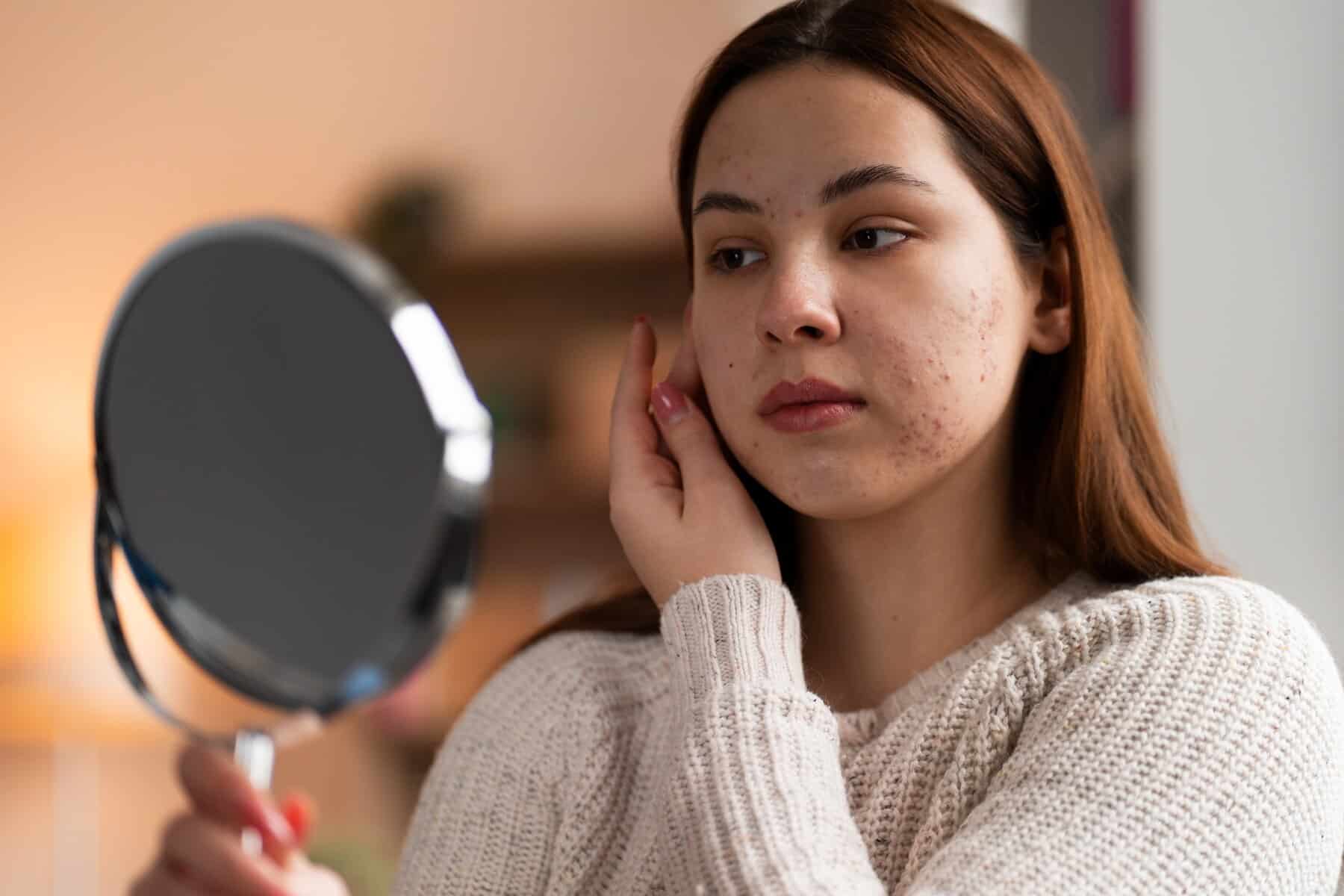
Stress-Related Acne Breakouts: Prevention Tips
Did you know that stress can wreak havoc on your skin? In a study conducted by the American Academy of Dermatology, it was found that stress-related acne breakouts affect up to 60% of individuals at some point in their lives. That’s a staggering number, highlighting the significant impact stress can have on your complexion.
Key Takeaways:
- Stress-related acne breakouts are a common issue that affects a large proportion of the population.
- Understanding the link between stress and acne is crucial for preventing and managing breakouts.
- Implementing stress management techniques alongside effective skincare routines can help maintain clear, healthy skin.
- Identifying the symptoms of stress-related acne is important for early intervention and treatment.
- Prioritizing self-care and mental well-being can significantly reduce the occurrence of stress-related breakouts.
What Does Stress-Related Acne Look Like? Understanding the Symptoms
Stress can have a significant impact on our skin, often leading to the development of acne breakouts. But what exactly does stress-related acne look like? Understanding the symptoms can help us identify and address these breakouts effectively.
When it comes to stress-related acne, the breakouts typically appear on the face, particularly in areas with a high concentration of oil glands. Common locations for stress-related breakouts include the forehead, cheeks, chin, and jawline.
These breakouts can manifest in different forms, such as:
- Pimples: These are small raised bumps on the skin, usually with a white or yellowish head.
- Pustules: Similar to pimples, pustules contain pus and have a red base with a yellow or white center.
- Papules: Papules are small, red, inflamed bumps that can be tender to the touch.
- Cysts: Deep, painful, and filled with pus, cysts are larger and can often leave scars.
It’s important to note that stress-related acne can be aggravated by other factors, such as hormonal imbalances, poor skincare routines, and dietary choices.
Emotional stress can also play a role in the development and severity of acne breakouts. The emotional toll of dealing with acne can further contribute to stress levels, creating a vicious cycle.
“Stress can directly influence the skin’s barrier function, leading to increased oil production and inflammation, which contribute to the development of acne breakouts.” – Dr. Elizabeth Miller, Dermatologist
Understanding the symptoms and emotional impact of stress-related acne is essential for the overall well-being of individuals. By recognizing the connection between emotional stress and skin health, we can take proactive measures to manage stress levels and minimize the occurrence of breakouts.
Visual representation of stress-related acne on the face (image for illustrative purposes only).
Managing Stress for Clear Skin: Tips and Techniques
Stress can often manifest on our skin, leading to pesky breakouts and blemishes. In this section, we will explore effective tips and techniques for managing stress to prevent acne breakouts and promote clear, healthy skin.
Understanding the Connection between Stress and Acne Breakouts
Stress has been found to exacerbate acne breakouts, making it crucial to address our stress levels for the sake of our skin health. When we experience high levels of stress, the body produces more cortisol, a hormone that can increase oil production in the skin. This excess oil, combined with the accumulation of dead skin cells, can clog pores and lead to breakouts.
Moreover, stress can also disrupt the balance of our skin’s microbiome, the community of beneficial bacteria that helps maintain skin health. When this balance is disrupted, inflammation may occur, further contributing to acne formation.
Preventing Stress-Related Breakouts
1. Prioritize Self-Care: Engage in activities that help you relax and unwind. This can include practicing mindfulness, meditation, taking warm baths, or indulging in hobbies that bring you joy.
2. Exercise Regularly: Physical activity releases endorphins, which can help alleviate stress and promote healthier skin. Incorporate at least 30 minutes of exercise into your daily routine.
3. Get Adequate Sleep: Lack of sleep can contribute to heightened stress levels and affect skin health. Aim for 7-9 hours of quality sleep each night to allow your skin to repair and rejuvenate.
4. Maintain a Healthy Diet: Eating a balanced diet rich in fruits, veggies, and whole grains can support overall skin health. Avoid or minimize consumption of processed foods, sugary snacks, and drinks.
Targeting Stress and Skin Health
1. Practice Stress-Relief Techniques: Experiment with different stress-relief techniques to find what works best for you. This can include deep breathing exercises, yoga, journaling, or talking to a trusted friend or therapist.
2. Establish a Skincare Routine: Consistency is key when it comes to skincare. Develop a routine that includes gentle cleansing, exfoliation, and moisturization with products suited for your skin type.
3. Seek Professional Help: If stress-related acne persists or worsens, consider consulting with a dermatologist or skincare professional. They can provide personalized advice and recommend suitable treatments or medical interventions.
By proactively managing stress and implementing these tips and techniques, you can significantly reduce the occurrence of stress-related breakouts and maintain clear, healthy skin.
Conclusion:
Stress-Related Acne Breakouts: Prevention Tips
In conclusion, understanding the triggers and impact of stress-related acne breakouts is essential for maintaining clear skin. By managing stress levels and implementing appropriate skincare routines, individuals can effectively prevent stress-induced breakouts. Prioritizing stress reduction and self-care is key in maintaining both mental and physical well-being, ultimately preventing stress-related acne breakouts.
Throughout this article, we have explored the visible symptoms of stress-related acne, the emotional impact it can have, and practical tips for managing stress to promote skin health. By recognizing the connection between stress and acne, individuals can take proactive steps to prevent breakouts and maintain a healthy complexion.
Remember, stress-related acne breakouts should not be taken lightly. Regularly practicing stress management techniques, such as exercise, meditation, and self-care, can help reduce stress levels and promote clear skin. Additionally, maintaining a consistent skincare routine with gentle cleansing, exfoliating, and moisturizing can further support healthy skin.
In conclusion, proactively managing stress and prioritizing self-care are the keys to preventing stress-related acne breakouts. By taking care of both mental and physical well-being, individuals can achieve clear, healthy skin even during high-stress periods.
Related read: Natural Anxiety Management Tips | No Meds Needed
FAQ
Q: Can stress cause acne breakouts?
A: Yes, stress can contribute to acne breakouts. When we experience stress, our bodies produce more stress hormones, such as cortisol, which can increase oil production and inflammation in the skin. This can lead to clogged pores and the development of acne.
Q: What does stress-related acne look like?
A: Stress-related acne can manifest in various ways. It may appear as red, inflamed pimples or small, pus-filled bumps. It can also be accompanied by other signs of inflammation, such as swelling and tenderness. Stress-related acne breakouts often occur on the face, particularly on the forehead, cheeks, and chin.
Q: Does stress really cause acne?
A: While stress alone may not directly cause acne, it can significantly contribute to its development. Stress influences hormone levels and triggers inflammation, both of which can exacerbate acne breakouts. Managing stress is crucial for maintaining overall skin health.
Q: How can I manage stress for clear skin?
A: Managing stress is important for preventing stress-related breakouts. Some tips include practicing stress-reducing techniques, such as meditation or deep breathing exercises. Additionally, maintaining a healthy lifestyle with regular exercise, sufficient sleep, and a balanced diet can help minimize the impact of stress on the skin.
Q: Can stress cause acne breakouts all over the body?
A: Although stress-related acne predominantly appears on the face, it can also affect other areas of the body, such as the chest, back, and shoulders. This is because stress hormones can impact oil production and inflammation in these areas as well.
Q: How can I prevent stress-related breakouts?
A: Preventing stress-related breakouts involves implementing stress management techniques such as regular exercise, getting enough sleep, and engaging in activities that promote relaxation. Additionally, establishing a consistent skincare routine with gentle cleansing and the use of non-comedogenic products can help keep the skin clear and minimize breakouts.






